Contract Law Report: Intention to Create Legal Relations Analysis
VerifiedAdded on 2023/01/03
|7
|1911
|33
Report
AI Summary
This report provides a comprehensive overview of contract law, specifically focusing on the essential element of 'Intention to Create Legal Relations.' It begins by defining agreements and their legal significance, emphasizing the binding nature of contracts. The report then delves into the landmark cases of Balfour v Balfour (1919) and Merritt v Merritt (1970), analyzing their impact on the understanding of legal intent, particularly within domestic and social agreements. The role of English courts in determining the intention to create legal relations is examined, highlighting the principles that govern the validity and enforceability of contracts. The report discusses how intention is assessed in various contexts, including economic, professional, and personal relationships, and the consequences of lacking such intent. It also explores the implications of agreements lacking the intention to create legal relations, emphasizing the importance of clearly defined terms and mutual consent. The conclusion summarizes the significance of clearly established contracts to avoid legal disputes and the role of courts in resolving such conflicts. References to relevant books and journals are included to support the analysis.

CONTRACT LAW
Paraphrase This Document
Need a fresh take? Get an instant paraphrase of this document with our AI Paraphraser

Table of Contents
INTRODUCTION...........................................................................................................................3
Question...........................................................................................................................................3
Balfour and Balfour (1919).........................................................................................................3
Merritt v Merritt (1970)...............................................................................................................3
Role of English courts with regards to the Intention to create legal relations requirement.........4
CONCLUSION................................................................................................................................6
REFERENCES................................................................................................................................7
INTRODUCTION...........................................................................................................................3
Question...........................................................................................................................................3
Balfour and Balfour (1919).........................................................................................................3
Merritt v Merritt (1970)...............................................................................................................3
Role of English courts with regards to the Intention to create legal relations requirement.........4
CONCLUSION................................................................................................................................6
REFERENCES................................................................................................................................7
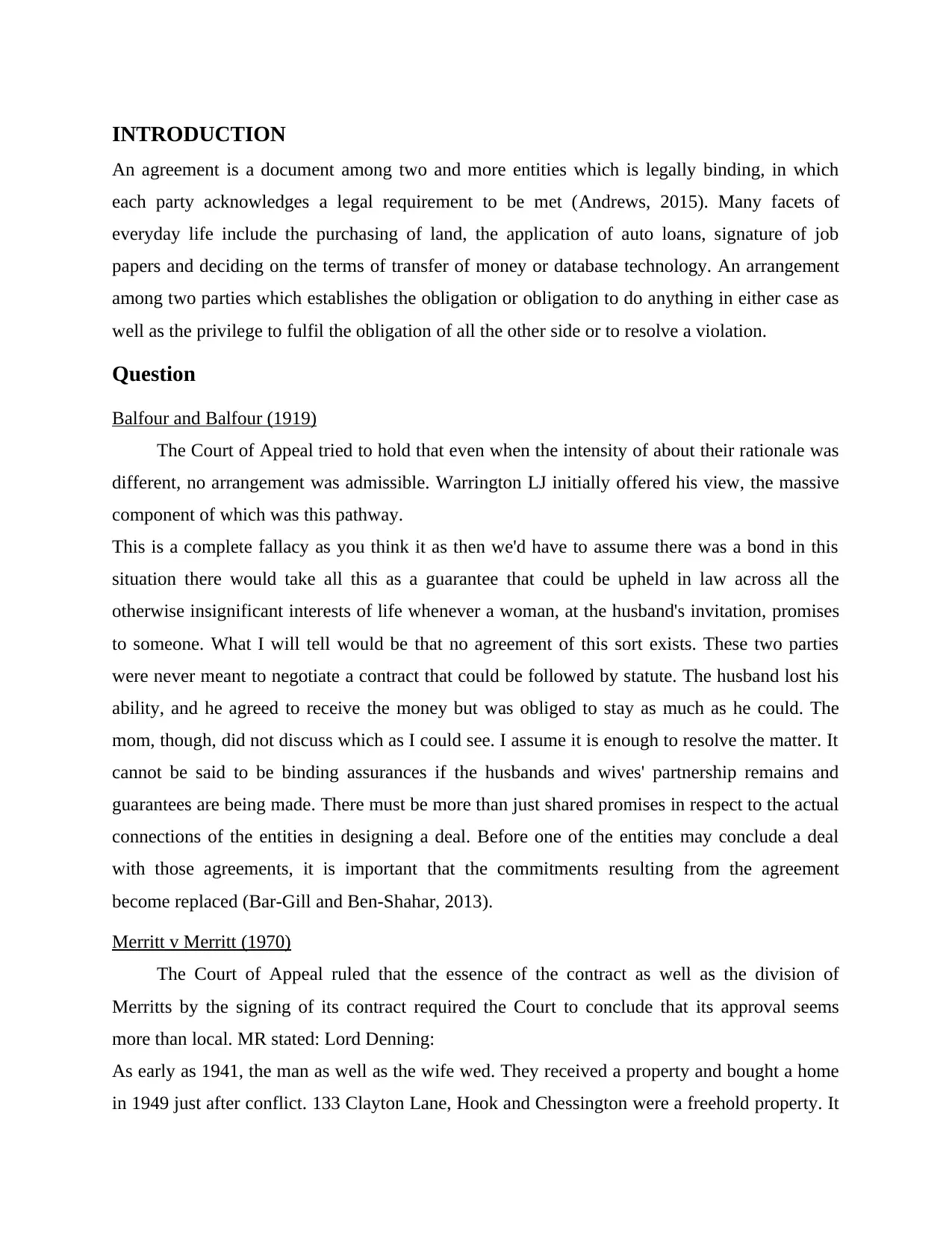
INTRODUCTION
An agreement is a document among two and more entities which is legally binding, in which
each party acknowledges a legal requirement to be met (Andrews, 2015). Many facets of
everyday life include the purchasing of land, the application of auto loans, signature of job
papers and deciding on the terms of transfer of money or database technology. An arrangement
among two parties which establishes the obligation or obligation to do anything in either case as
well as the privilege to fulfil the obligation of all the other side or to resolve a violation.
Question
Balfour and Balfour (1919)
The Court of Appeal tried to hold that even when the intensity of about their rationale was
different, no arrangement was admissible. Warrington LJ initially offered his view, the massive
component of which was this pathway.
This is a complete fallacy as you think it as then we'd have to assume there was a bond in this
situation there would take all this as a guarantee that could be upheld in law across all the
otherwise insignificant interests of life whenever a woman, at the husband's invitation, promises
to someone. What I will tell would be that no agreement of this sort exists. These two parties
were never meant to negotiate a contract that could be followed by statute. The husband lost his
ability, and he agreed to receive the money but was obliged to stay as much as he could. The
mom, though, did not discuss which as I could see. I assume it is enough to resolve the matter. It
cannot be said to be binding assurances if the husbands and wives' partnership remains and
guarantees are being made. There must be more than just shared promises in respect to the actual
connections of the entities in designing a deal. Before one of the entities may conclude a deal
with those agreements, it is important that the commitments resulting from the agreement
become replaced (Bar-Gill and Ben-Shahar, 2013).
Merritt v Merritt (1970)
The Court of Appeal ruled that the essence of the contract as well as the division of
Merritts by the signing of its contract required the Court to conclude that its approval seems
more than local. MR stated: Lord Denning:
As early as 1941, the man as well as the wife wed. They received a property and bought a home
in 1949 just after conflict. 133 Clayton Lane, Hook and Chessington were a freehold property. It
An agreement is a document among two and more entities which is legally binding, in which
each party acknowledges a legal requirement to be met (Andrews, 2015). Many facets of
everyday life include the purchasing of land, the application of auto loans, signature of job
papers and deciding on the terms of transfer of money or database technology. An arrangement
among two parties which establishes the obligation or obligation to do anything in either case as
well as the privilege to fulfil the obligation of all the other side or to resolve a violation.
Question
Balfour and Balfour (1919)
The Court of Appeal tried to hold that even when the intensity of about their rationale was
different, no arrangement was admissible. Warrington LJ initially offered his view, the massive
component of which was this pathway.
This is a complete fallacy as you think it as then we'd have to assume there was a bond in this
situation there would take all this as a guarantee that could be upheld in law across all the
otherwise insignificant interests of life whenever a woman, at the husband's invitation, promises
to someone. What I will tell would be that no agreement of this sort exists. These two parties
were never meant to negotiate a contract that could be followed by statute. The husband lost his
ability, and he agreed to receive the money but was obliged to stay as much as he could. The
mom, though, did not discuss which as I could see. I assume it is enough to resolve the matter. It
cannot be said to be binding assurances if the husbands and wives' partnership remains and
guarantees are being made. There must be more than just shared promises in respect to the actual
connections of the entities in designing a deal. Before one of the entities may conclude a deal
with those agreements, it is important that the commitments resulting from the agreement
become replaced (Bar-Gill and Ben-Shahar, 2013).
Merritt v Merritt (1970)
The Court of Appeal ruled that the essence of the contract as well as the division of
Merritts by the signing of its contract required the Court to conclude that its approval seems
more than local. MR stated: Lord Denning:
As early as 1941, the man as well as the wife wed. They received a property and bought a home
in 1949 just after conflict. 133 Clayton Lane, Hook and Chessington were a freehold property. It
⊘ This is a preview!⊘
Do you want full access?
Subscribe today to unlock all pages.

Trusted by 1+ million students worldwide
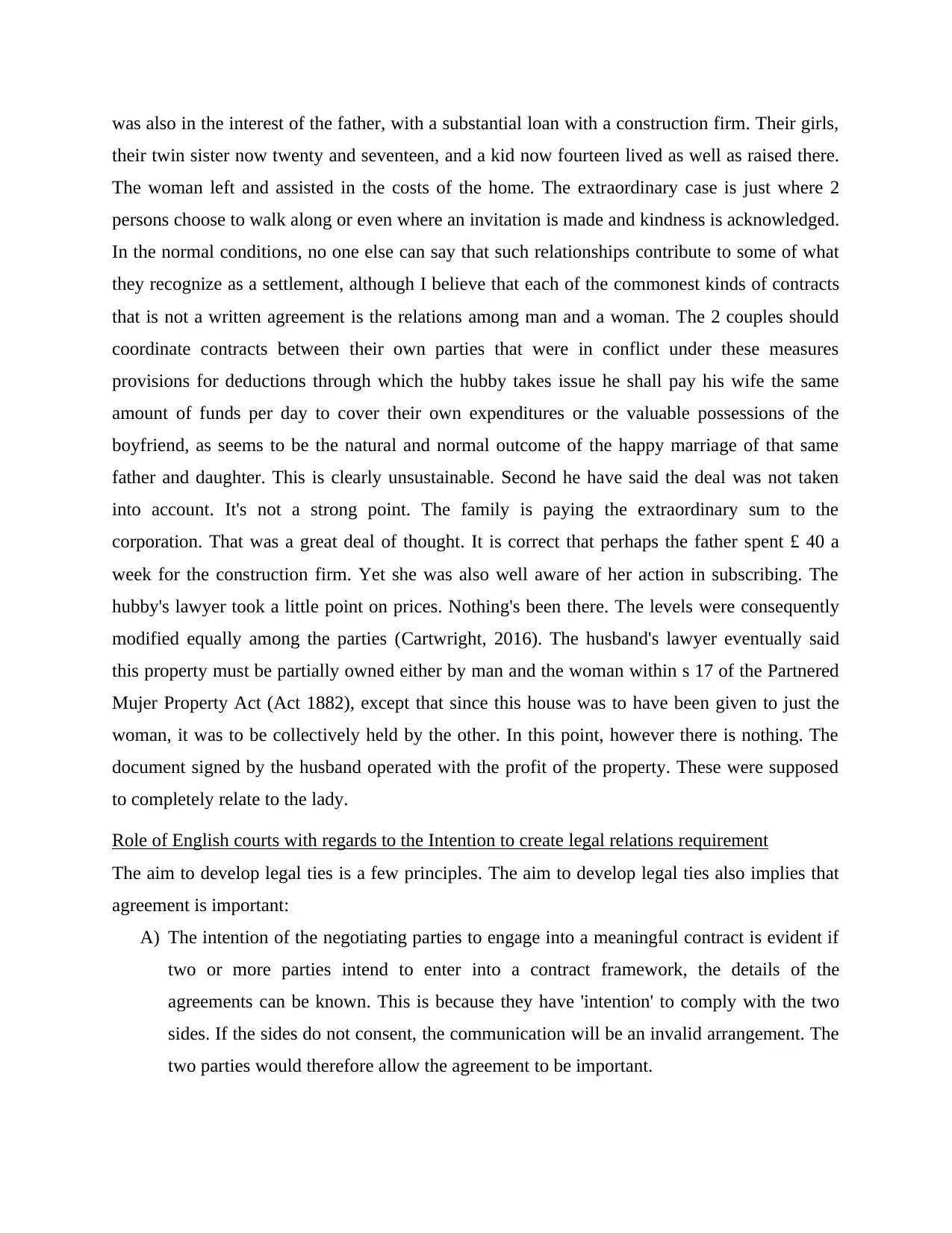
was also in the interest of the father, with a substantial loan with a construction firm. Their girls,
their twin sister now twenty and seventeen, and a kid now fourteen lived as well as raised there.
The woman left and assisted in the costs of the home. The extraordinary case is just where 2
persons choose to walk along or even where an invitation is made and kindness is acknowledged.
In the normal conditions, no one else can say that such relationships contribute to some of what
they recognize as a settlement, although I believe that each of the commonest kinds of contracts
that is not a written agreement is the relations among man and a woman. The 2 couples should
coordinate contracts between their own parties that were in conflict under these measures
provisions for deductions through which the hubby takes issue he shall pay his wife the same
amount of funds per day to cover their own expenditures or the valuable possessions of the
boyfriend, as seems to be the natural and normal outcome of the happy marriage of that same
father and daughter. This is clearly unsustainable. Second he have said the deal was not taken
into account. It's not a strong point. The family is paying the extraordinary sum to the
corporation. That was a great deal of thought. It is correct that perhaps the father spent £ 40 a
week for the construction firm. Yet she was also well aware of her action in subscribing. The
hubby's lawyer took a little point on prices. Nothing's been there. The levels were consequently
modified equally among the parties (Cartwright, 2016). The husband's lawyer eventually said
this property must be partially owned either by man and the woman within s 17 of the Partnered
Mujer Property Act (Act 1882), except that since this house was to have been given to just the
woman, it was to be collectively held by the other. In this point, however there is nothing. The
document signed by the husband operated with the profit of the property. These were supposed
to completely relate to the lady.
Role of English courts with regards to the Intention to create legal relations requirement
The aim to develop legal ties is a few principles. The aim to develop legal ties also implies that
agreement is important:
A) The intention of the negotiating parties to engage into a meaningful contract is evident if
two or more parties intend to enter into a contract framework, the details of the
agreements can be known. This is because they have 'intention' to comply with the two
sides. If the sides do not consent, the communication will be an invalid arrangement. The
two parties would therefore allow the agreement to be important.
their twin sister now twenty and seventeen, and a kid now fourteen lived as well as raised there.
The woman left and assisted in the costs of the home. The extraordinary case is just where 2
persons choose to walk along or even where an invitation is made and kindness is acknowledged.
In the normal conditions, no one else can say that such relationships contribute to some of what
they recognize as a settlement, although I believe that each of the commonest kinds of contracts
that is not a written agreement is the relations among man and a woman. The 2 couples should
coordinate contracts between their own parties that were in conflict under these measures
provisions for deductions through which the hubby takes issue he shall pay his wife the same
amount of funds per day to cover their own expenditures or the valuable possessions of the
boyfriend, as seems to be the natural and normal outcome of the happy marriage of that same
father and daughter. This is clearly unsustainable. Second he have said the deal was not taken
into account. It's not a strong point. The family is paying the extraordinary sum to the
corporation. That was a great deal of thought. It is correct that perhaps the father spent £ 40 a
week for the construction firm. Yet she was also well aware of her action in subscribing. The
hubby's lawyer took a little point on prices. Nothing's been there. The levels were consequently
modified equally among the parties (Cartwright, 2016). The husband's lawyer eventually said
this property must be partially owned either by man and the woman within s 17 of the Partnered
Mujer Property Act (Act 1882), except that since this house was to have been given to just the
woman, it was to be collectively held by the other. In this point, however there is nothing. The
document signed by the husband operated with the profit of the property. These were supposed
to completely relate to the lady.
Role of English courts with regards to the Intention to create legal relations requirement
The aim to develop legal ties is a few principles. The aim to develop legal ties also implies that
agreement is important:
A) The intention of the negotiating parties to engage into a meaningful contract is evident if
two or more parties intend to enter into a contract framework, the details of the
agreements can be known. This is because they have 'intention' to comply with the two
sides. If the sides do not consent, the communication will be an invalid arrangement. The
two parties would therefore allow the agreement to be important.
Paraphrase This Document
Need a fresh take? Get an instant paraphrase of this document with our AI Paraphraser
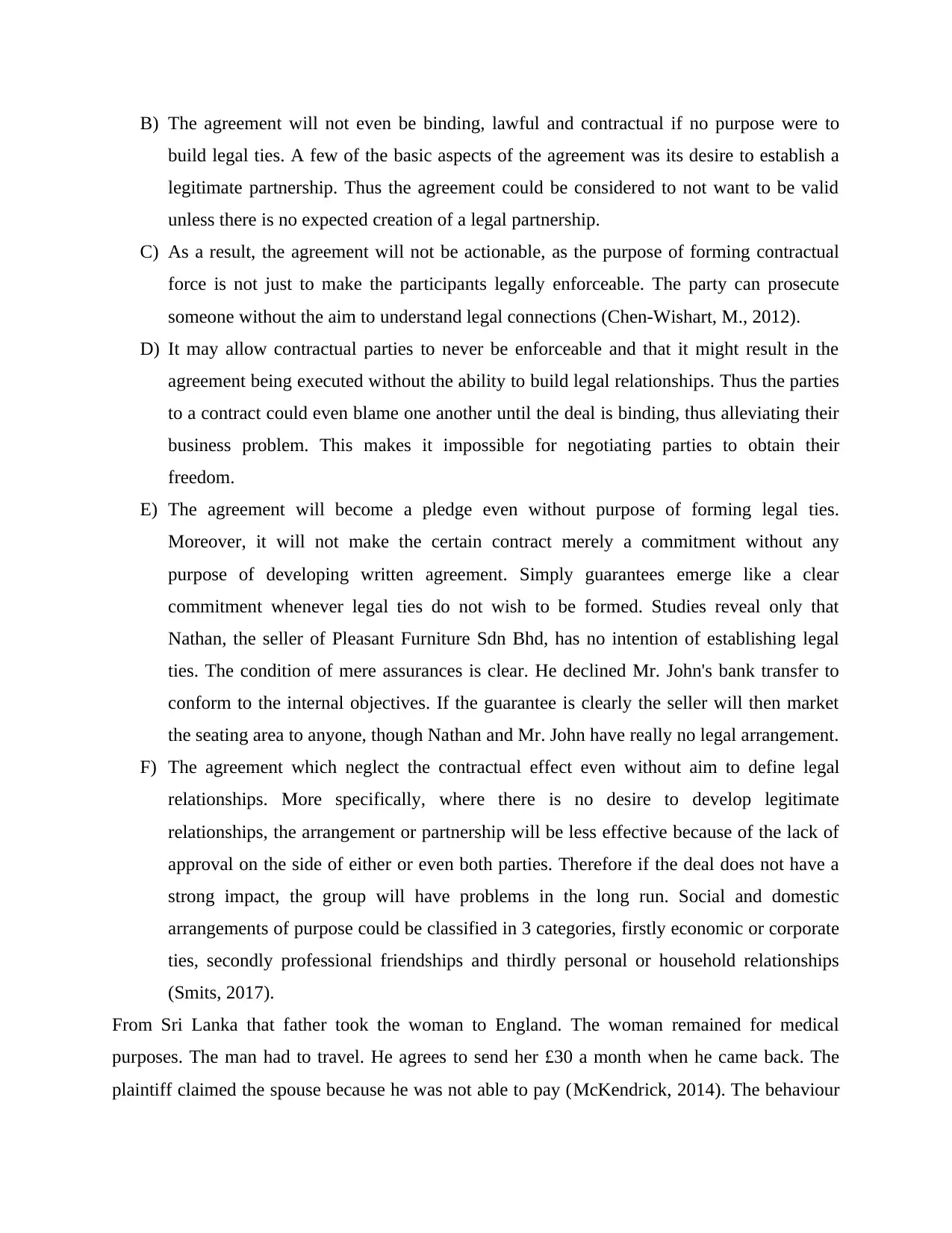
B) The agreement will not even be binding, lawful and contractual if no purpose were to
build legal ties. A few of the basic aspects of the agreement was its desire to establish a
legitimate partnership. Thus the agreement could be considered to not want to be valid
unless there is no expected creation of a legal partnership.
C) As a result, the agreement will not be actionable, as the purpose of forming contractual
force is not just to make the participants legally enforceable. The party can prosecute
someone without the aim to understand legal connections (Chen-Wishart, M., 2012).
D) It may allow contractual parties to never be enforceable and that it might result in the
agreement being executed without the ability to build legal relationships. Thus the parties
to a contract could even blame one another until the deal is binding, thus alleviating their
business problem. This makes it impossible for negotiating parties to obtain their
freedom.
E) The agreement will become a pledge even without purpose of forming legal ties.
Moreover, it will not make the certain contract merely a commitment without any
purpose of developing written agreement. Simply guarantees emerge like a clear
commitment whenever legal ties do not wish to be formed. Studies reveal only that
Nathan, the seller of Pleasant Furniture Sdn Bhd, has no intention of establishing legal
ties. The condition of mere assurances is clear. He declined Mr. John's bank transfer to
conform to the internal objectives. If the guarantee is clearly the seller will then market
the seating area to anyone, though Nathan and Mr. John have really no legal arrangement.
F) The agreement which neglect the contractual effect even without aim to define legal
relationships. More specifically, where there is no desire to develop legitimate
relationships, the arrangement or partnership will be less effective because of the lack of
approval on the side of either or even both parties. Therefore if the deal does not have a
strong impact, the group will have problems in the long run. Social and domestic
arrangements of purpose could be classified in 3 categories, firstly economic or corporate
ties, secondly professional friendships and thirdly personal or household relationships
(Smits, 2017).
From Sri Lanka that father took the woman to England. The woman remained for medical
purposes. The man had to travel. He agrees to send her £30 a month when he came back. The
plaintiff claimed the spouse because he was not able to pay (McKendrick, 2014). The behaviour
build legal ties. A few of the basic aspects of the agreement was its desire to establish a
legitimate partnership. Thus the agreement could be considered to not want to be valid
unless there is no expected creation of a legal partnership.
C) As a result, the agreement will not be actionable, as the purpose of forming contractual
force is not just to make the participants legally enforceable. The party can prosecute
someone without the aim to understand legal connections (Chen-Wishart, M., 2012).
D) It may allow contractual parties to never be enforceable and that it might result in the
agreement being executed without the ability to build legal relationships. Thus the parties
to a contract could even blame one another until the deal is binding, thus alleviating their
business problem. This makes it impossible for negotiating parties to obtain their
freedom.
E) The agreement will become a pledge even without purpose of forming legal ties.
Moreover, it will not make the certain contract merely a commitment without any
purpose of developing written agreement. Simply guarantees emerge like a clear
commitment whenever legal ties do not wish to be formed. Studies reveal only that
Nathan, the seller of Pleasant Furniture Sdn Bhd, has no intention of establishing legal
ties. The condition of mere assurances is clear. He declined Mr. John's bank transfer to
conform to the internal objectives. If the guarantee is clearly the seller will then market
the seating area to anyone, though Nathan and Mr. John have really no legal arrangement.
F) The agreement which neglect the contractual effect even without aim to define legal
relationships. More specifically, where there is no desire to develop legitimate
relationships, the arrangement or partnership will be less effective because of the lack of
approval on the side of either or even both parties. Therefore if the deal does not have a
strong impact, the group will have problems in the long run. Social and domestic
arrangements of purpose could be classified in 3 categories, firstly economic or corporate
ties, secondly professional friendships and thirdly personal or household relationships
(Smits, 2017).
From Sri Lanka that father took the woman to England. The woman remained for medical
purposes. The man had to travel. He agrees to send her £30 a month when he came back. The
plaintiff claimed the spouse because he was not able to pay (McKendrick, 2014). The behaviour
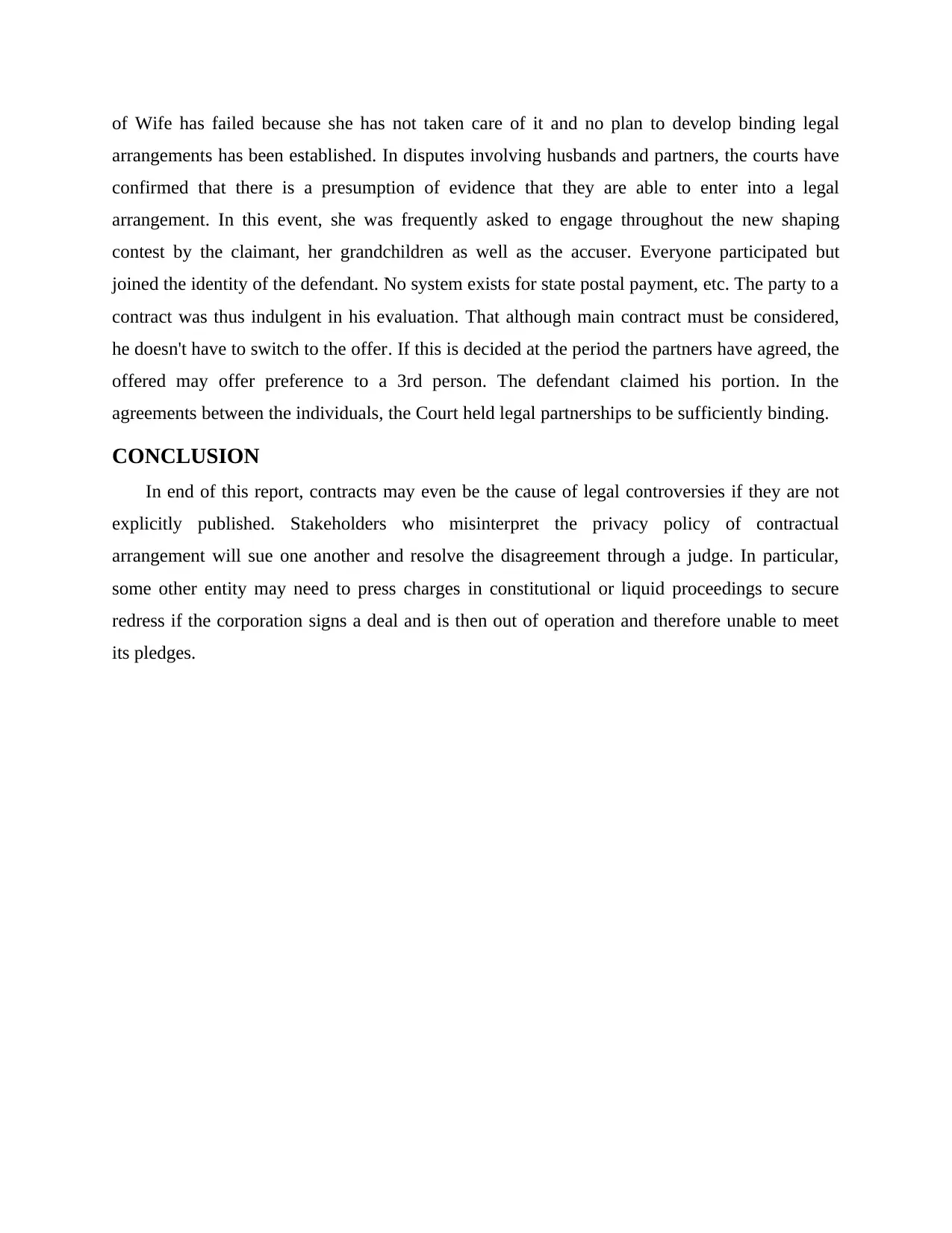
of Wife has failed because she has not taken care of it and no plan to develop binding legal
arrangements has been established. In disputes involving husbands and partners, the courts have
confirmed that there is a presumption of evidence that they are able to enter into a legal
arrangement. In this event, she was frequently asked to engage throughout the new shaping
contest by the claimant, her grandchildren as well as the accuser. Everyone participated but
joined the identity of the defendant. No system exists for state postal payment, etc. The party to a
contract was thus indulgent in his evaluation. That although main contract must be considered,
he doesn't have to switch to the offer. If this is decided at the period the partners have agreed, the
offered may offer preference to a 3rd person. The defendant claimed his portion. In the
agreements between the individuals, the Court held legal partnerships to be sufficiently binding.
CONCLUSION
In end of this report, contracts may even be the cause of legal controversies if they are not
explicitly published. Stakeholders who misinterpret the privacy policy of contractual
arrangement will sue one another and resolve the disagreement through a judge. In particular,
some other entity may need to press charges in constitutional or liquid proceedings to secure
redress if the corporation signs a deal and is then out of operation and therefore unable to meet
its pledges.
arrangements has been established. In disputes involving husbands and partners, the courts have
confirmed that there is a presumption of evidence that they are able to enter into a legal
arrangement. In this event, she was frequently asked to engage throughout the new shaping
contest by the claimant, her grandchildren as well as the accuser. Everyone participated but
joined the identity of the defendant. No system exists for state postal payment, etc. The party to a
contract was thus indulgent in his evaluation. That although main contract must be considered,
he doesn't have to switch to the offer. If this is decided at the period the partners have agreed, the
offered may offer preference to a 3rd person. The defendant claimed his portion. In the
agreements between the individuals, the Court held legal partnerships to be sufficiently binding.
CONCLUSION
In end of this report, contracts may even be the cause of legal controversies if they are not
explicitly published. Stakeholders who misinterpret the privacy policy of contractual
arrangement will sue one another and resolve the disagreement through a judge. In particular,
some other entity may need to press charges in constitutional or liquid proceedings to secure
redress if the corporation signs a deal and is then out of operation and therefore unable to meet
its pledges.
⊘ This is a preview!⊘
Do you want full access?
Subscribe today to unlock all pages.

Trusted by 1+ million students worldwide
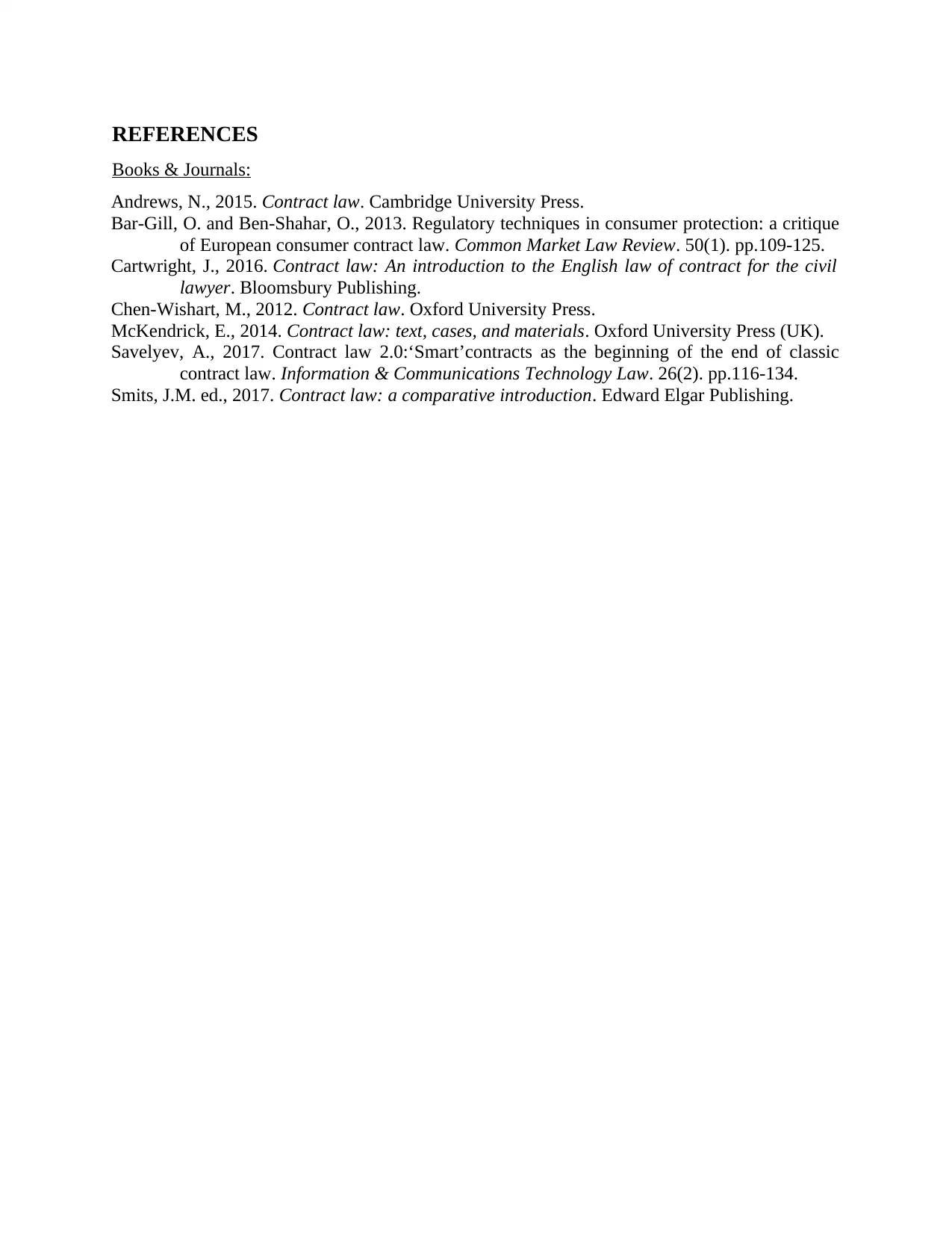
REFERENCES
Books & Journals:
Andrews, N., 2015. Contract law. Cambridge University Press.
Bar-Gill, O. and Ben-Shahar, O., 2013. Regulatory techniques in consumer protection: a critique
of European consumer contract law. Common Market Law Review. 50(1). pp.109-125.
Cartwright, J., 2016. Contract law: An introduction to the English law of contract for the civil
lawyer. Bloomsbury Publishing.
Chen-Wishart, M., 2012. Contract law. Oxford University Press.
McKendrick, E., 2014. Contract law: text, cases, and materials. Oxford University Press (UK).
Savelyev, A., 2017. Contract law 2.0:‘Smart’contracts as the beginning of the end of classic
contract law. Information & Communications Technology Law. 26(2). pp.116-134.
Smits, J.M. ed., 2017. Contract law: a comparative introduction. Edward Elgar Publishing.
Books & Journals:
Andrews, N., 2015. Contract law. Cambridge University Press.
Bar-Gill, O. and Ben-Shahar, O., 2013. Regulatory techniques in consumer protection: a critique
of European consumer contract law. Common Market Law Review. 50(1). pp.109-125.
Cartwright, J., 2016. Contract law: An introduction to the English law of contract for the civil
lawyer. Bloomsbury Publishing.
Chen-Wishart, M., 2012. Contract law. Oxford University Press.
McKendrick, E., 2014. Contract law: text, cases, and materials. Oxford University Press (UK).
Savelyev, A., 2017. Contract law 2.0:‘Smart’contracts as the beginning of the end of classic
contract law. Information & Communications Technology Law. 26(2). pp.116-134.
Smits, J.M. ed., 2017. Contract law: a comparative introduction. Edward Elgar Publishing.
1 out of 7
Related Documents
Your All-in-One AI-Powered Toolkit for Academic Success.
+13062052269
info@desklib.com
Available 24*7 on WhatsApp / Email
![[object Object]](/_next/static/media/star-bottom.7253800d.svg)
Unlock your academic potential
Copyright © 2020–2026 A2Z Services. All Rights Reserved. Developed and managed by ZUCOL.



